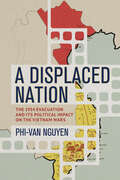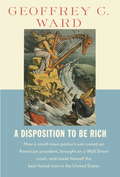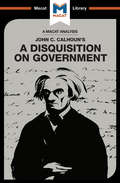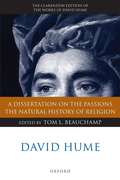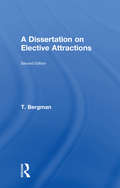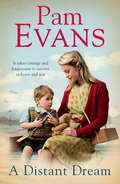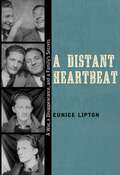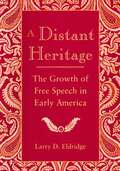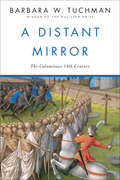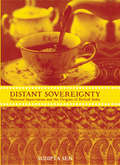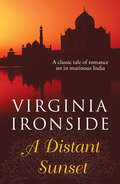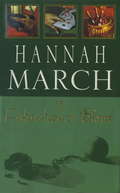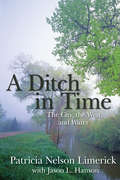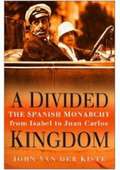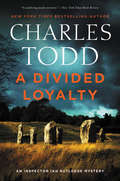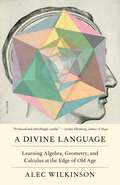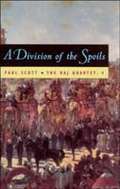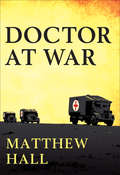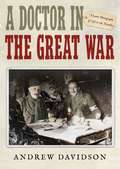- Table View
- List View
A Displaced Nation: The 1954 Evacuation and Its Political Impact on the Vietnam Wars (Studies of the Weatherhead East Asian Institute, Columbia University)
by Phi-Van NguyenIn A Displaced Nation, Phi-Van Nguyen argues that the displacement of eighty thousand mostly Roman Catholic evacuees from North Vietnam in 1954 had a profound impact on the war opposing Saigon on both Hanoi and on the evacuees themselves. Assisting with the transportation, emergency relief, and resettlement of the evacuees allowed diverse organizations and the United States to support Saigon. This transnational mobilization also convinced the evacuees the "free world" would never let Vietnam remain divided.Many people see the Vietnam wars spanning from 1945 to 1989 as separate conflicts. But Nguyen demonstrates that the evacuees experienced a continuous civil war. A Displaced Nation shows the evacuees felt so validated by transnational support that they thought they could use this external help to return one day to the north. This belief was not constant nor were the strategies to achieve it the same for all, but through their political activism and action the evacuees showed they were willing to seize any opportunity to oppose Hanoi during the subsequent decades, even once established overseas.
A Disposition to Be Rich
by Geoffrey C. WardFerdinand Ward was the greatest swindler of the Gilded Age. Through his unapologetic villainy, he bankrupted Ulysses S. Grant and ran roughshod over the entire world of finance. Now, his compelling, behind-the-scenes story is told--told by his great-grandson, award-winning historian Geoffrey C. Ward.Ward was the Bernie Madoff of his day, a supposed genius at making big money fast on Wall Street who turned out to have been running a giant pyramid scheme--one that ultimately collapsed in one of the greatest financial scandals in American history. The son of a Protestant missionary and small-town pastor with secrets of his own to keep, Ward came to New York at twenty-one and in less than a decade, armed with charm, energy, and a total lack of conscience, made himself the business partner of the former president of the United States and was widely hailed as the "Young Napoleon of Finance." In truth, he turned out to be a complete fraud, his entire life marked by dishonesty, cowardice, and contempt for anything but his own interests.Drawing from thousands of family documents never before examined, Geoffrey C. Ward traces his great-grandfather's rapid rise to riches and fame and his even more dizzying fall from grace. There are mistresses and mansions along the way; fast horses and crooked bankers and corrupt New York officials; courtroom confrontations and six years in Sing Sing; and Ferdinand's desperate scheme to kidnap his own son to get his hands on the estate his late wife had left the boy. Here is a great story about a classic American con artist, told with boundless charm and dry wit by one of our finest historians.
A Disquisition on Government
by Etienne Stockland Jason XidiasNineteenth-century American politician John C. Calhoun occupies a paradoxical place in the history of political thought – and of critical thinking. On one hand, he is remembered as a committed advocate of slavery, consistently espousing views that are now considered indefensible and abhorrent. On the other, the political theories that Calhoun used to defend the social injustice of slavery have become the basis of the very systems by which modern democracies defend minority rights. Despite being crafted in defence of a system as unjust as slavery, the arguments that Calhoun expressed about minority rights in democracies in A Disquisition On Government remain an excellent example of how problem solving skills and reasoning can come together. The problem, for Calhoun, was both specific and general. As matters stood in the late 1840s, the majority of American states were anti-slavery, with only the minority, Southern states remaining pro-slavery. This boiled down to a crucial issue with democracy: the US government should not, Calhoun argued, only respect the wishes of the majority. Instead, democratic government must aim to harmonize diverse groups and their interests – governing, in so far as possible, for everyone. His analysis of how the Southern states could protect what he saw as their right to keep slaves led Calhoun to formulate solutions to the problem of ‘the tyranny of the majority’ that have since helped defend far worthier minority views.
A Dissertation On The Passions: The Natural History Of Religion
by David Hume Tom L. BeauchampDavid Hume (1711-1776) is one of the greatest of philosophers. Today he probably ranks highest of all British philosophers in terms of influence and philosophical standing. His philosophical work ranges across morals, the mind, metaphysics, epistemology, religion, and aesthetics; he had broadinterests not only in philosophy as it is now conceived but in history, politics, economics, religion, and the arts. He was a master of English prose. <P><P> The Clarendon Hume Edition will include all of his works except his History of England and minor historical writings. It is the only thorough critical edition, and will provide a far more extensive scholarly treatment than any previous editions. This edition (which has been in preparation since the 1970s) offers authoritative annotation, bibliographical information, and indexes, and draws upon the major advances in textual scholarship that have been made since the publication of earlier editions--advances both in the understanding of editorial principle and practice and in knowledge of the history of Hume's own texts. <P> In this volume, Tom Beauchamp presents two essays from Four Dissertations (1757), the last philosophical work written by Hume, which was subsequently revised by the philosopher in the remaining years of his life. Whilst the bulk of A Dissertation on the Passions was extracted from passages in ATreatise of Human Nature, The Natural History of Religion was an original work when published in 1757, as well as the only major work devoted exclusively to the subject of religion that Hume published in his lifetime. Together with Hume's earlier work on religious topics, this essay drewconsiderable philosophical commentary from his contemporaries. The last edition of the two works in this volume seen through the press by Hume himself appeared in 1772. It provides the copy-text for this critical edition. The Editor's primarily historical Introduction discusses the genesis, revision, and reception of these two dissertations, which went into ten editions at the author's hand. It will appeal to scholars across many disciplines.
A Dissertation of Elective Attractions
by Torbern BergmanFirst Published in 1970. This is the second edition of Dissertation of Elective Attractions, by Bergman, and includes a new introduction. The text was first published in English in 1785 after being translated from the original latin in 1775 by Thomas Beddoes. The text is an introduction to the table of elective attractions used in chemistry.
A Distant Dream: It takes courage and forgiveness to survive sickness and war
by Pamela EvansA loving family. A deadly illness. A country on the brink of war. Pam Evans, much-loved author of In the Dark Streets Shining, brings us an enthralling and heart-wrenching saga about the enduring power of love, courage and friendship during the dark days of war. Perfect for fans of Dilly Court and Cathy Sharp. 'A superb and heartwarming read' - Irish IndependentIt's 1936 in West London, and fifteen-year-old May Stubbs and her family have endured the worst of The Depression. Looking forward to a more prosperous future, they take on a derelict cricket pavilion, convert it into a café and general store, and find it quickly becomes the hub of the community. Then May contracts tuberculosis, and the way ahead looks less certain. Leaving her best friend, Betty Lane, and lifelong soul mate, George Bailey, behind, she is sent away to fight off the illness. But on her return to London, she finds things have changed. And when war is declared, it is clear that serious complications and heartache lie in store for them all. What readers are saying about A Distant Dream: 'Where would the book world be without Pamela Evans books to brighten our day! I can't praise this book enough and am eagerly awaiting the next one from this author' 'Not just a wonderful story, but wonderful characters... you feel as though you have made new friends. I always thoroughly enjoy Pamela Evans books and think this one has to be one of her best'
A Distant Heartbeat: A War, a Disappearance, and a Family's Secrets
by Eunice LiptonOn May 20, 1938, a young man from the Bronx informs his parents that he is leaving for the Catskills to begin his new job as a waiter. Instead, he sails for Europe to join the Abraham Lincoln Brigade in the Spanish Civil War, the opening round in the fight against Hitler and Mussolini. The man, Dave Lipton—the author&’s uncle—sends letter after letter home detailing his hopes and begging for forgiveness. He never receives a reply.Decades later, Eunice Lipton stumbles upon clues for this silence, uncovering details of Dave&’s exhilarating political life in New York, his shuttered romantic life, and his deep friendship with another volunteer. A Distant Heartbeat tells a tale of passion and heroism, centered on a fierce competition between brothers, a packet of missing letters, and the unforeseen results of family betrayal.
A Distant Heritage: The Growth of Free Speech in Early America (Critical America #82)
by Larry EldridgeHistorians often rely on a handful of unusual cases to illustrate the absence of free speech in the colonies—such as that of Richard Barnes, who had his arms broken and a hole bored through his tongue for seditious words against the governor of Virginia. In this definitive and accessible work, Larry Eldridge convincingly debunks this view by revealing surprising evidence of free speech in early America.Using the court records of every American colony that existed before 1700 and an analysis of over 1,200 seditious speech cases sifted from those records, A Distant Heritage shows how colonists experienced a dramatic expansion during the seventeenth century of their freedom to criticize government and its officials. Exploring important changes in the roles of juries and appeals, the nature of prosecution and punishment, and the pattern of growing leniency, Eldridge also shows us why this expansion occurred when it did. He concludes that the ironic combination of tumult and destabilization on the one hand, and steady growth and development on the other, made colonists more willing to criticize authority openly and officials less able to prevent it. That, in turn, established a foundation for the more celebrated flowering of colonial dissent against English authority in the eighteenth century.Steeped in primary sources and richly narrated, this is an invaluable addition to the library of anyone interested in legal history, colonial America, or the birth of free speech in the United States.
A Distant Mirror: The Calamitous 14th Century
by Barbara W. TuchmanBarbara W. Tuchman--the acclaimed author of the Pulitzer Prize-winning classic The Guns of August--once again marshals her gift for character, history, and sparkling prose to compose an astonishing portrait of medieval Europe. The fourteenth century reflects two contradictory images: on the one hand, a glittering age of crusades, cathedrals, and chivalry; on the other, a world plunged into chaos and spiritual agony. In this revelatory work, Barbara W. Tuchman examines not only the great rhythms of history but the grain and texture of domestic life: what childhood was like; what marriage meant; how money, taxes, and war dominated the lives of serf, noble, and clergy alike. Granting her subjects their loyalties, treacheries, and guilty passions, Tuchman re-creates the lives of proud cardinals, university scholars, grocers and clerks, saints and mystics, lawyers and mercenaries, and, dominating all, the knight--in all his valor and "furious follies," a "terrible worm in an iron cocoon."
A Distant Prayer
by Joseph Banks Jerry BorrowmanJoseph Banks served in a B-17 bomber during WWII. This is a first-hand narrative of his experiences in the military and as a prisoner of war: his sufferings, his triumphs, his joys.
A Distant Sovereignty: National Imperialism and the Origins of British India
by Sudipta SenIn this broad study of British rule in India during the late eighteenth and early nineteenth centuries, Sudipta Sen takes up this dual agenda, sketching out the interrelationships between nationalism, imperialism, and identity formation as they played out in both England and South Asia.
A Distant Sunset
by Virginia Ironside'We are married now,' said Richard softly. 'We may not be married in a church and you may not have taken my name, but here... here we are married.' 19th century Devon. On the day Richard Applevale leaves for India, Elizabeth Shawcross gives herself to him, secure in the knowledge that he loves her, and that he will one day return to make her his wife. But Elizabeth soon finds herself pregnant with the child of a man she fears she will never see again, for she has heard nothing from India. Heart-broken and terrified of what will become of her and her child, she is forced to wed the arrogant Mr Whittle. With him she travels to the subcontinent, where she is confronted with her former lover. But once again, Richard and Lizzie are kept apart by circumstances out of their control. From acclaimed author Virginia Ironside, A Distant Sunset is a classic tale of adventure and romance.
A Distinction of Blood (Robert Fairfax 3)
by Hannah MarchThe third novel in the gripping Georgian mystery series chronicling the adventures of Robert Fairfax. A must-read for fans of historical crime fiction.Engaged as tutor to the children of a wealthy and ambitious sugar merchant, Samuel Appleton, Robert Fairfax soon finds that his employer has work of a more delicate nature for him to do. Appleton's beautiful daughter, Charlotte, has made a very good marriage to the rakish and aristocratic Lord Mortlock - but all is not well.Urged to investigate discreetly, Fairfax finds evidence of gambling debts, love affairs - and intrigue. When Lord Mortlock is found murdered in his bed, Fairfax must find the truth behind an elegant facade of lies and unmask an evil killer...
A Distinction of Blood (Robert Fairfax 3)
by Hannah MarchThe third novel in the gripping Georgian mystery series chronicling the adventures of Robert Fairfax. A must-read for fans of historical crime fiction.Engaged as tutor to the children of a wealthy and ambitious sugar merchant, Samuel Appleton, Robert Fairfax soon finds that his employer has work of a more delicate nature for him to do. Appleton's beautiful daughter, Charlotte, has made a very good marriage to the rakish and aristocratic Lord Mortlock - but all is not well.Urged to investigate discreetly, Fairfax finds evidence of gambling debts, love affairs - and intrigue. When Lord Mortlock is found murdered in his bed, Fairfax must find the truth behind an elegant facade of lies and unmask an evil killer...
A Ditch in Time
by Patricia Nelson Limerick Jason HansonThe history of water development . . . offers a particularly fine post for observing the astonishing and implausible workings of historical change and, in response, for cultivating an appropriate level of humility and modesty in our anticipations of our own unknowable future. Tracing the origins and growth of the Denver Water Department, this study of water and its unique role and history in the West, as well as in the nation, raises questions about the complex relationship among cities, suburbs, and rural areas, allowing us to consider this precious resource and its past, present, and future with both optimism and realism. Patricia Nelson Limerick is the faculty director and board chair of the Center of the American West at the University of Colorado, where she is also a professor of history and environmental studies. She currently serves as the vice president for the teaching division of the American Historical Association. Her most widely read book, The Legacy of Conquest, is in its twenty-fifth year of publication.
A Divided Kingdom: The Spanish Monarchy from Isabel to Juan Carlos
by John KisteThere is little available on the dramatic and colourful history of the Spanish monarchy. Experienced author and historian John Van der Kiste provides a readable and anecdotal look at one of the key European dynasties from the nineteenth century to the present. He begins with the wayward, ill-educated Isabella II, who was forced to marry her nephew. During much of her reign power was in the hands of her generals and her exile and abdication saw the crown of Spain hawked round Europe for two years. It was briefly accepted then refused by Prince Leopold of Hohenzollern-Sigmaringen - thus starting the Franco-Prussian War - and, after a short, unsuccessful stint as a republic, the monarchy was restored when Isabella's son Alfonso XIII was chosen as King. John Van der Kiste leads us through his popular reign, the reign of his son - who married one of Queen Victoria's granddaughters - and the socialist movement in Spain after the Great War which led to the dictatorship of Primo de Rovera. Finishing with the Spanish Civil War, the 'reign' of General Franco and the return of the monarchy with the present King, Juan Carlos, this is a fascinating look at the Spanish Bourbons.
A Divided Loyalty: A Novel (Inspector Ian Rutledge Mysteries #22)
by Charles ToddScotland Yard detective Ian Rutledge is assigned one of the most baffling investigations of his career—a cold murder case with an unidentified victim and a cold trail with few clues to follow.Chief Inspector Brian Leslie, a respected colleague of Ian Rutledge’s, is sent to Avebury, a village set inside a great prehistoric stone circle not far from Stonehenge. A young woman has been murdered next to a mysterious, hooded, figure-like stone, but no one recognizes her—or admits to it. And how did she get there? Despite a thorough investigation, it appears that her killer has simply vanished. Rutledge, returning from the conclusion of a case involving another apparently unknown woman, is asked to take a second look at Leslie’s inquiry, to see if he can identify this victim. But Rutledge is convinced Chief Superintendent Jameson only hopes to tarnish his earlier success once he also fails.Where to begin? He too finds very little to go on in Avebury, slowly widening his search beyond the village—only to discover that unlikely—possibly even unreliable—clues are pointing him toward an impossible solution, one that will draw the wrath of the Yard down on him, and very likely see him dismissed if he pursues it. But what about the victim—what does he owe this tragic woman? Where must his loyalty lie?
A Divided Republic: Nation, State and Citizenship in Contemporary France
by Emile ChabalThis book is an original and sophisticated historical interpretation of contemporary French political culture. Until now, there have been few attempts to understand the political consequences of the profound geopolitical, intellectual and economic changes that France has undergone since the 1970s. However, Emile Chabal's detailed study shows how passionate debates over citizenship, immigration, colonial memory, the reform of the state and the historiography of modern France have galvanised the French elite and created new spaces for discussion and disagreement. Many of these debates have coalesced around two political languages - republicanism and liberalism - both of which structure the historical imagination and the symbolic vocabulary of French political actors. The tension between these two political languages has become the central battleground of contemporary French politics. It is around these two poles that politicians, intellectuals and members of France's vast civil society have tried to negotiate the formidable challenges of ideological uncertainty and a renewed sense of global insecurity.
A Divine Language: Learning Algebra, Geometry, and Calculus at the Edge of Old Age
by Alec WilkinsonA New York Times Book Review Editors' Choice"Wilkinson has accomplished something more moving and original, braiding his stumbling attempts to get better at math with his deepening awareness that there’s an entire universe of understanding that will, in some fundamental sense, forever lie outside his reach." —Jennifer Szalai, The New York Times "There is almost no writer I admire as much as I do Alec Wilkinson. His work has enduring brilliance and humanity.” —Susan Orlean, author of The Library Book A spirited, metaphysical exploration into math's deepest mysteries and conundrums at the crux of middle age.Decades after struggling to understand math as a boy, Alec Wilkinson decides to embark on a journey to learn it as a middle-aged man. What begins as a personal challenge—and it's challenging—soon transforms into something greater than a belabored effort to learn math. Despite his incompetence, Wilkinson encounters a universe of unexpected mysteries in his pursuit of mathematical knowledge and quickly becomes fascinated; soon, his exercise in personal growth (and torture) morphs into an intellectually expansive exploration.In A Divine Language, Wilkinson, a contributor to The New Yorker for over forty years, journeys into the heart of the divine aspect of mathematics—its mysteries, challenges, and revelations—since antiquity. As he submits himself to the lure of deep mathematics, he takes the reader through his investigations into the subject’s big questions—number theory and the creation of numbers, the debate over math’s human or otherworldly origins, problems and equations that remain unsolved after centuries, the conundrum of prime numbers. Writing with warm humor and sharp observation as he traverses practical math’s endless frustrations and rewards, Wilkinson provides an awe-inspiring account of an adventure from a land of strange sights. Part memoir, part metaphysical travel book, and part journey in self-improvement, A Divine Language is one man’s second attempt at understanding the numbers in front of him, and the world beyond.
A Division of the Spoils: 4
by Paul ScottAfter exploiting India's divisions for years, the British depart in such haste that no one is prepared for the Hindu-Muslim riots of 1947. The twilight of the raj turns bloody. Against the backdrop of the violent partition of India and Pakistan, A Division of the Spoils illuminates one last bittersweet romance, revealing the divided loyalties of the British as they flee, retreat from, or cling to India.
A Doctor at War
by Matthew HallDoctor at War charts the fascinating account of one man's wartime experiences. Born in Geneva in 1909, Colonel Martin Herford served in the Spanish Civil War, then, on the outbreak of World War II, he saw service in Finland and across Europe as the Allies drove the Germans back to their homeland. Herford was even present at the liberation of Belsen, the notorious concentration camp.A testament to Churchill's famous maxim 'when you're going through hell, keep going', Herford is an inspiration, and this book is a moving account of his heroism, utilising contemporary diaries, letters, notes and official dispatches.Even though the doctors, nurses and stretcher-bearers of the military are every bit as courageous as the front line soldiers, they are very seldom written about. The image of a team of medics tucked away behind the front lines is far from accurate as very often the wounded were treated in the midst of battle with bullets flying and shells exploding all around.
A Doctor in The Great War
by Andrew DavidsonFeaturing 250 previously unknown photographs, this is the extraordinary true story of a young doctor whose photos left behind an astonishing firsthand account of life at the front of World War I.As a twenty-five-year-old medical officer and one of the first doctors to win the Military Cross, Fred Davidson took countless photographs while he served in the trenches from 1914-1915. Though he took them illegally, more than 250 of the photographs shot by Davidson and his fellow officers survived and are now shared for the first time in this harrowing, eye-catching, and poignant narrative of the Great War. In A Doctor in the Great War, author Andrew Davidson--the grandson of Fred--depicts the everyday lives of soldiers, both on and off duty: from the parade ground at Glasgow's Maryhill to the brothels of Armentieres, from the band of brothers who dubbed themselves "Old Contemptibles" to the original folding Kodak and Ansco cameras they used. It is the story of the 1st Cameronians, who achieved notoriety for selling the Great War's earliest front line photographs. And it is a deeply personal account of the pictures that have been passed down for three generations, describing the men who fought with Fred Davidson, the conditions they served in, the battles they saw, and the horrors they endured. A must-have for history and photography enthusiasts alike, this glimpse of the War to End All Wars is an unusually intimate portrait that will engulf you in the lives of soldiers and leave you humbled and amazed.
A Doctor in The Great War
by Andrew DavidsonFeaturing 250 previously unknown photographs, this is the extraordinary true story of a young doctor whose photos left behind an astonishing firsthand account of life at the front of World War I.As a twenty-five-year-old medical officer and one of the first doctors to win the Military Cross, Fred Davidson took countless photographs while he served in the trenches from 1914-1915. Though he took them illegally, more than 250 of the photographs shot by Davidson and his fellow officers survived and are now shared for the first time in this harrowing, eye-catching, and poignant narrative of the Great War. In A Doctor in the Great War, author Andrew Davidson--the grandson of Fred--depicts the everyday lives of soldiers, both on and off duty: from the parade ground at Glasgow's Maryhill to the brothels of Armentieres, from the band of brothers who dubbed themselves "Old Contemptibles" to the original folding Kodak and Ansco cameras they used. It is the story of the 1st Cameronians, who achieved notoriety for selling the Great War's earliest front line photographs. And it is a deeply personal account of the pictures that have been passed down for three generations, describing the men who fought with Fred Davidson, the conditions they served in, the battles they saw, and the horrors they endured. A must-have for history and photography enthusiasts alike, this glimpse of the War to End All Wars is an unusually intimate portrait that will engulf you in the lives of soldiers and leave you humbled and amazed.
A Doctor in The Great War: Unseen Photographs of Life in the Trenches
by Andrew DavidsonFeaturing 250 previously unknown photographs, this is the extraordinary true story of a young doctor whose photos left behind an astonishing firsthand account of life at the front of World War I.As a twenty-five-year-old medical officer and one of the first doctors to win the Military Cross, Fred Davidson took countless photographs while he served in the trenches from 1914-1915. Though he took them illegally, more than 250 of the photographs shot by Davidson and his fellow officers survived and are now shared for the first time in this harrowing, eye-catching, and poignant narrative of the Great War. In A Doctor in the Great War, author Andrew Davidson--the grandson of Fred--depicts the everyday lives of soldiers, both on and off duty: from the parade ground at Glasgow's Maryhill to the brothels of Armentieres, from the band of brothers who dubbed themselves "Old Contemptibles" to the original folding Kodak and Ansco cameras they used. It is the story of the 1st Cameronians, who achieved notoriety for selling the Great War's earliest front line photographs. And it is a deeply personal account of the pictures that have been passed down for three generations, describing the men who fought with Fred Davidson, the conditions they served in, the battles they saw, and the horrors they endured. A must-have for history and photography enthusiasts alike, this glimpse of the War to End All Wars is an unusually intimate portrait that will engulf you in the lives of soldiers and leave you humbled and amazed.
